 Petzlover
Petzlover Long Haired Chihuahua is originated from Mexico but Sage Koochee is originated from Afghanistan. Long Haired Chihuahua may grow 66 cm / 25 inches shorter than Sage Koochee. Long Haired Chihuahua may weigh 77 kg / 169 pounds lesser than Sage Koochee. Long Haired Chihuahua may live 6 years more than Sage Koochee. Long Haired Chihuahua may have less litter size than Sage Koochee. Long Haired Chihuahua requires Moderate Maintenance. But Sage Koochee requires Low Maintenance
Long Haired Chihuahua is originated from Mexico but Sage Koochee is originated from Afghanistan. Long Haired Chihuahua may grow 66 cm / 25 inches shorter than Sage Koochee. Long Haired Chihuahua may weigh 77 kg / 169 pounds lesser than Sage Koochee. Long Haired Chihuahua may live 6 years more than Sage Koochee. Long Haired Chihuahua may have less litter size than Sage Koochee. Long Haired Chihuahua requires Moderate Maintenance. But Sage Koochee requires Low Maintenance
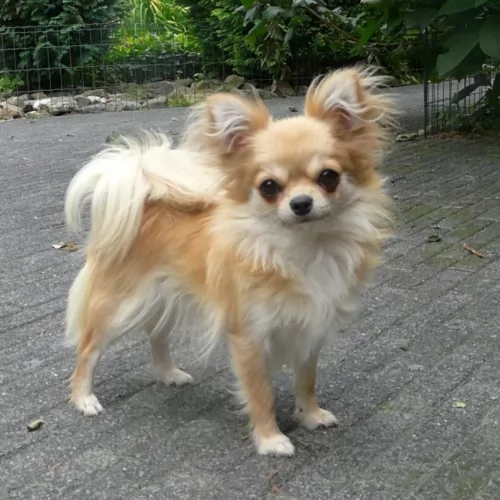 The short haired Chihuahua is such a recognizable dog breed, probably because of his tiny size, but did you know that you also get a long haired variety?
The short haired Chihuahua is such a recognizable dog breed, probably because of his tiny size, but did you know that you also get a long haired variety?
Looking quite a bit like a Pomeranian, the only difference between the two types of Chihuahua is the length of the coat.
This small dog dates back to Mayan times and while it may well have originated in Mexico, its popularity saw it becoming a sought after pet in other countries too.
To get the long haired Chihuahua, breeding programs were established and the short-haired variety was mated with other long haired toy sized dogs such as the Pomeranian and the Yorkshire Terrier.
 Known also as the Kuchi Dog, the Sage Koochee is a dog that was bred more for his characteristics than his looks. He was bred to be a protector and guardian and named after the Afghan Kochi people.
Known also as the Kuchi Dog, the Sage Koochee is a dog that was bred more for his characteristics than his looks. He was bred to be a protector and guardian and named after the Afghan Kochi people.
Referred to as the Kuchi or Sage Kuchi, this working dog has always helped nomads with guarding their caravans and livestock. The dog has genetic resemblance with the Central Asian Ovcharka but isn’t recognized as an official breed by any of the major kennel clubs.
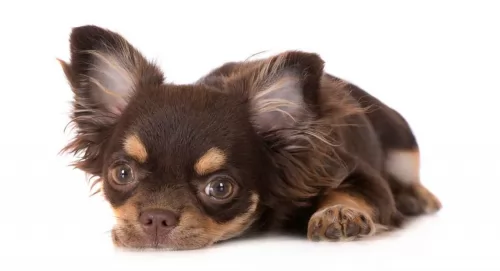 Your long haired Chihuahua will have a coat that is soft and slightly wavy. He weighs between 1 and 3kg and stands at about 15 – 23cm. He generally sheds throughout the year with a couple of heavier shedding periods during the year.
Your long haired Chihuahua will have a coat that is soft and slightly wavy. He weighs between 1 and 3kg and stands at about 15 – 23cm. He generally sheds throughout the year with a couple of heavier shedding periods during the year.
Don’t be fooled by the long, thick hair on the long haired Chihuahua as it doesn’t protect him from the cold – in fact he doesn’t tolerate the cold well at all, and is essentially an indoor dog. The ears are erect and feathery and the tail is full and plumed, lying over the back. He has a ruff on the neck, which is often described as a mane.
Chihuahuas are such bright-as-a-button little dogs and they’re intelligent too.
It’s difficult to say how a dog’s temperament will turn out, because breed, lifestyle and the type of owners can all make a dog a certain way.
Socialization and training can sometimes help with a dog that has bad genes. There are some people who say the Long haired Chihuahua is a nasty, aggressive little dog who’ll easily give you a nip but they’ve got a good reputation with many other dog lovers.
They love their own human family but may take quite a while to chill towards other people and other dogs too. They’re more ‘birds of a feather flock together’ type of dogs, preferring to get on with other Chihuahua dogs.
 The Sage Koochee is a large molosser dog, although they do vary quite a bit in height. This is because they generally come in 3 varieties.
The Sage Koochee is a large molosser dog, although they do vary quite a bit in height. This is because they generally come in 3 varieties.
They can stand at between 58 to 89cm in height and they weigh between 38 to 80kg. This is because this dog is divided into 3 types. The coat of this dog can be short, medium or long, and colors can vary quite a bit as well.
These are moderate, seasonal shedders. Their tails are usually docked to about 1/3 of their length and their ears have been traditionally docked too. They are very territorial and won’t show any tolerance to strangers coming onto the property. He also tends to be aggressive towards other dogs.
These dogs are tough and fierce and also immensely intelligent. Such a dog would have to be trained and socialized or you would land yourself with a strong-willed, disobedient dog.
Once they’ve had training, they are friendly, obedient and affectionate towards their owners, but aren't a good choice for children. They are extremely territorial and make good watchdogs,being prepared to fiercely protect their human family.
The very nature of this dog makes it not suitable for life in the city. It would be terribly frustrated in small spaces and can become aggressive.
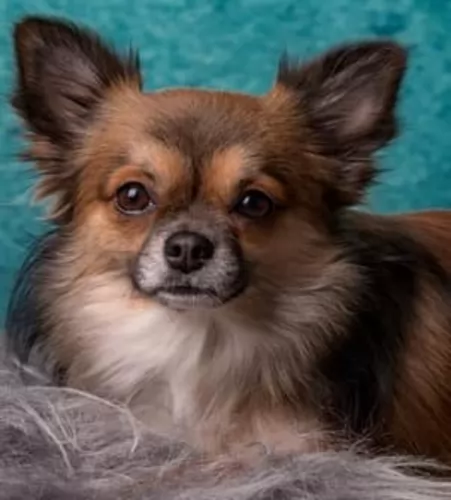 The Chihuahua is such a feisty, courageous, confident little dog who also believes that he is part- lion. He is loving, sweet and gentle and just loves being picked up and petted non-stop. He looks up at you, moving his front paws up and down to tell you that he wants to be picked up.
The Chihuahua is such a feisty, courageous, confident little dog who also believes that he is part- lion. He is loving, sweet and gentle and just loves being picked up and petted non-stop. He looks up at you, moving his front paws up and down to tell you that he wants to be picked up.
He is in 7th heaven when he can be cuddled up in your lap. You just have to teach your children to be very careful with him and not enter into games with him that are too rough and tumble. Tiny he may be but he makes a great watchdog too, barking and alerting you to strangers.
His small size makes him perfect for life in the city or in the countryside. Just be careful when in the countryside lest an Eagle or Owl scoop him up and carry him off to some faraway nest.
He doesn’t need a great deal of exercise either and you can actually keep him happily busy with some games indoors. He’ll always welcome walks with you though.
This small dog is full of life and confidence and he is ready to be your constant, loving companion.
 The Kuchi has always been vigilant with guarding livestock, and these tough dogs did the job of guardian and protector extremely well.
The Kuchi has always been vigilant with guarding livestock, and these tough dogs did the job of guardian and protector extremely well.
They’re hardy too, used to coping with extreme weather conditions, from hot deserts to freezing mountain areas. These dogs are powerful and independent and they are also dangerous.
With good training and socialization they can become loving and loyal, but they require a strong, firm owner, and don’t come as recommended if there are children in the home.
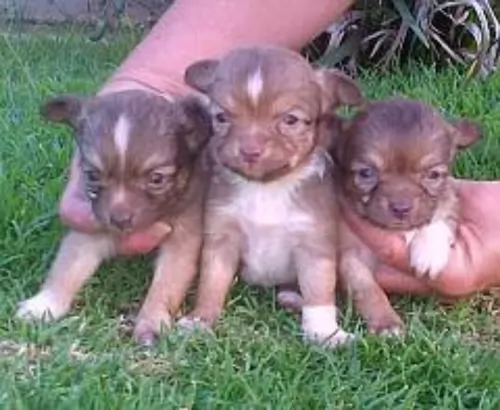 With good care, you’ll have your long haired Chihuahua with you for a long time – 15 years and longer.
With good care, you’ll have your long haired Chihuahua with you for a long time – 15 years and longer.
Make sure to de-worm your Chihuahua. Worms and other parasites can be deadly for your pet and the vet will do preventative deworming on a regular basis.
You Chihuahua will need to be vaccinated when he is a puppy and even when he is an adult, although less often. These vaccines will protect your Chihuahua from the likes of parvo, distemper and rabies. Have your chihuahua spayed or neutered.
There are so many puppies in the world who can’t find homes. Desexing your Chihuahua is a responsible way to ensure your pet doesn’t have puppies. Spaying and neutering can actually be beneficial for your dog’s health.
 The Kuchi breed is healthy and doesn’t have any particular health issues. Things to look out for are bloat, skin allergies, cancer and parasites.
The Kuchi breed is healthy and doesn’t have any particular health issues. Things to look out for are bloat, skin allergies, cancer and parasites.
Parasites are a common in many dogs. Fleas and ticks are external parasites, but intestinal parasites can be a real nuisance too and endanger your dog’s health.
These parasites live within the dog’s gastrointestinal tract. They can be a host of terrible worms such as roundworm, hookworms and tapeworm among others. The parasites are usually transmitted when the dog ingests contaminated food, soil or even feces.
These parasites can cause endless problems for the dog, from weight loss to diarrhea to vomiting. You will need to get your pet to the vet.
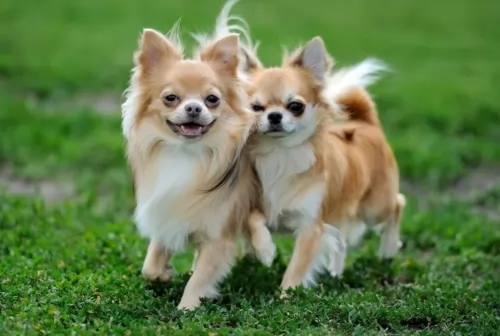 The pint-sized long-haired Chihuahua isn’t going to take up too much of your time in terms of grooming. Make sure you brush him at least twice a week to ensure his long hair doesn’t tangle. Small dogs are prone to dental problems, so try and brush his teeth at least 2 or 3 times a week with special doggy toothbrush- and toothpaste.
The pint-sized long-haired Chihuahua isn’t going to take up too much of your time in terms of grooming. Make sure you brush him at least twice a week to ensure his long hair doesn’t tangle. Small dogs are prone to dental problems, so try and brush his teeth at least 2 or 3 times a week with special doggy toothbrush- and toothpaste.
Take your puppy Chihuahua to the vet for his regular vaccinations to prevent him getting dangerous illnesses.
Feed him a high quality dog food. He is a high energy dog so buy high quality food that caters for small, lively dogs. Try and feed him such home made food from time to time. Remember that with small dogs, high-salt diets can contribute to kidney problems.
Never overfeed your Chihuahua as obesity opens up major health problems in Chihuahuas.
 A nutritious commercially manufactured dog food for large working dogs will be required for this strong, energetic dog. You want to provide it with some variety, so some homemade food added into the dry kibble twice a week will ensure he is healthy and content.
A nutritious commercially manufactured dog food for large working dogs will be required for this strong, energetic dog. You want to provide it with some variety, so some homemade food added into the dry kibble twice a week will ensure he is healthy and content.
Home-made food such as boiled chicken, brown rice or pasta and spinach, sweet potatoes and carrots all boiled slowly together will delight your pet. You just chop it up and add it to the dry kibble twice a week and your pet will never look back.
For his skin and coat, you can try to add in a little bit of raw meat occasionally.Dogs thrive on simple, consistent meals like this – nothing weird and spicy so as to avoid stomach upsets.
Groom your Kuchi dog by brushing him twice a week and check simultaneously for any lumps you may find on him.
Trim his nails.
Check his eyes and make sure they are clear with no signs of discharge.
Check inside the mouth for rotten or bad teeth as he can’t tell you if one is rotten and causing him tremendous pain and discomfort.
Make sure his vaccines are up to date to avoid life threatening canine diseases.
Provide him with a nice, warm dry place to sleep.
Make sure he has access to shade and sun when he’s outdoors.
Have him or her spayed or neutered to avoid puppies